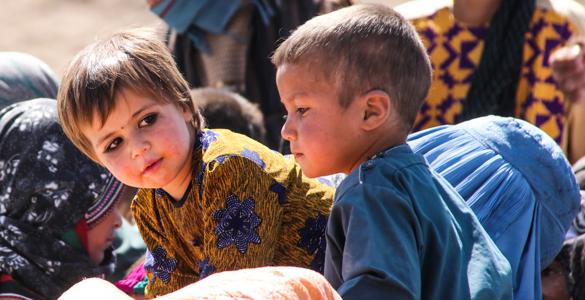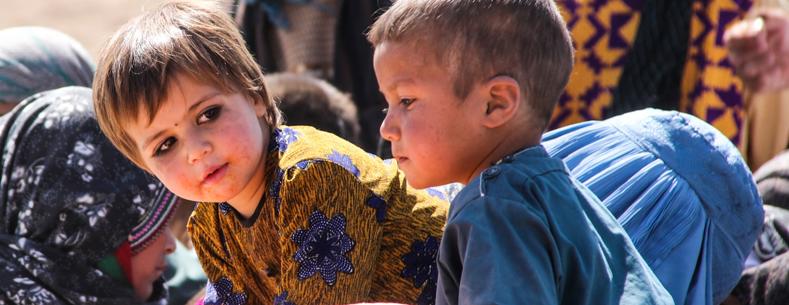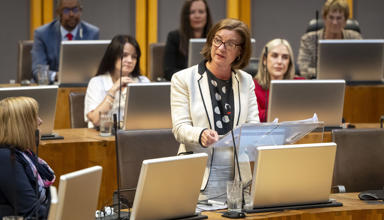On 29 August, 98 states pledged to assist people who are trying to flee Afghanistan.
The UK agreed to resettle 5,000 people in the first year and 20,000 in the coming years. Women and girls are considered most at risk and will be prioritised.
Immigration is the responsibility of the UK Government but asylum seekers and refugees who come to Wales receive public services and support provided by the Welsh Government, local authorities and other organisations.
In 2019, the Welsh Government declared that Wales would become the world’s first ‘Nation of Sanctuary’; a plan endorsed by the United Nations. The Welsh Government believes that “a distinctive Welsh response” is now needed.
This article outlines what the Afghanistan crisis could mean for Wales and summarises the response so far.
International responsibilities
The UK has international legal responsibilities to protect refugees. The Welsh Government is required by the devolution settlement to comply with these obligations.
Alongside 148 other countries, the UK is a party to the 1951 Refugee Convention, a global treaty overseen by the United Nations.
| The core principle of the Refugee Convention is ‘non-refoulement’, which means that a refugee should not be returned to a country where they face serious threats to their life or freedom. |
The UK is also party to other treaties which protect refugees, such as the European Convention of Human Rights (ECHR).
The Welsh Government’s Nation of Sanctuary plan explains how it will ensure that Wales fulfils its international obligations.
Refugee or asylum seeker?
The Refugee Convention defines ‘refugee’ and ‘asylum seeker’ as follows:
|
Refugee A person outside of their country, who has a well-founded fear of persecution because of their race, religion, nationality, membership of a particular social group or political opinion. They are unable or unwilling to return there, for fear of persecution |
Asylum seeker A person who has crossed an international border in search of protection but whose claim for refugee status has not yet been decided. Until they receive a decision as to whether or not they are a refugee, they are known as an asylum seeker. |
Arrivals from Afghanistan via the UK’s resettlement routes established in response to the crisis will be considered refugees. Those who arrive outside of the resettlement routes are able to apply for asylum.In the UK, asylum seekers and refugees do not have the same rights. For example, asylum seekers can’t work or claim benefits but refugees can.
Devolution: who will deliver what?
The Prime Minister agreed to host a four-nations summit to coordinate the UK’s response to the Afghanistan crisis. The details of the summit have not yet been published.
Arrivals from Afghanistan will receive different types of support from the UK and devolved governments. Use these dropdown menus to find out more.
The UK Government has announced two schemes for people fleeing Afghanistan:
- Afghanistan Relocations and Assistance Policy (ARAP). ARAP, or ‘Operation Warm Welcome’, applies to Afghans who have worked closely with the British military and UK Government in Afghanistan.
- The Afghan Citizens' Resettlement Scheme applies to Afghan citizens deemed most at risk of human rights abuses and dehumanising treatment by the Taliban, including women and girls. This scheme is not yet open and limited information is available.
Asylum seekers and refugees who come to Wales access public services provided by the Welsh Government, such as healthcare and education.
More detail of the UK Government’s resettlement plans are anticipated, which the Welsh Government states will better enable it to plan and support arrivals from Afghanistan.
Support provided by the Welsh Government also includes its Sanctuary website, free legal advice and temporary internet access.
Afghanistan: “a distinctive Welsh response”
It is not yet known how many Afghan refugees will be resettled in Wales.
Stakeholders indicated to the BBC on 26 August that they expect Wales to receive between five and seven per cent of the UK intake but stressed that the number is unknown.
The Welsh Government’s Minister for Social Justice, Jane Hutt, issued a statement on 26 August outlining “a distinctive Welsh response to the Afghanistan evacuation”, with Welsh public authorities working “flat out to ensure we play a full part” in the UK response.
The statement explains that:
- Every Welsh Local Authority has come forward to offer properties. WalesOnline has more information.
- The First Minister and Minister for Social Justice met with stakeholders to discuss the support Wales can offer, building on the support previously offered during the Syrian refugee crisis. The BBC covered the talks, held on 26 August.
- The Minister promoted helplines, including mental health support for veterans and armed forces personnel.
- The Welsh Government has written to the UK Government to pledge its commitment to “help in any way that it can and to seek urgent clarity on a number of important issues”, including greater clarity on planning arrangements.
UK legislation
Afghans arriving in the UK outside the resettlement routes described above may be affected by the UK Government’s Nationality & Borders Bill, which is making its way through the UK Parliament.
Humanitarian organisations and parliamentarians have raised concerns that the Bill could be used to criminalise those arriving in the UK without permission.
The UN has warned that the right to asylum of Afghans arriving spontaneously in the UK is “under threat” from the Bill. The UN was previously “saddened” to see the Bill pass its second reading in the UK Parliament.
On 17 June, the Welsh Government advised that it planned to ensure that the UK Government “fully understands” its views on its new immigration plans.
Next steps
At the time of writing, the UK and Welsh responses to the crisis are two of many moving pieces.
Several questions remain unanswered, such as how many refugees will be resettled in Wales and how UK governments will work together to deliver support.
Meanwhile, the Minister has emphasised that Wales “must do all that is possible to ensure Afghan interpreters, refugees and their families are able to reach safety and find a welcome here”. She has promised to update the Senedd in September.
Article by Sara Moran, Senedd Research, Welsh Parliament






